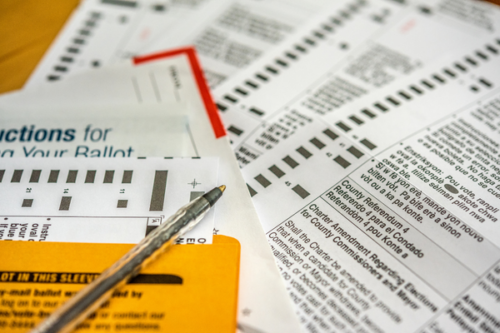
Podcast
Inside Trump’s White House
White House reporter Annie Linskey offers a closer look at how the Trump White House makes decisions and what recent actions reveal about its strategy.
Media Release
In Ensuring All Votes Count: Reducing Rejected Ballots, Wang and Alitamirano tackle the questions: Were mail ballots rejected at a higher rate in 2020 compared to previous years? What impact did policy changes, the political environment, and voter outreach have on mail ballot rejection rates in such an extraordinary election year?
Cambridge, MA—Heading into the 2020 elections there was mounting fear that mail-in ballots, anticipated to be widely used, might be rejected at a higher rate, leaving voters disenfranchised. Today, the Ash Center for Democratic Governance and Innovation released a new policy brief in which authors Tova Wang and Jose Altamirano dissect trends in mail ballot rejection rates in 2020 to better understand what actually unfolded.
In Ensuring All Votes Count: Reducing Rejected Ballots, Wang and Alitamirano tackle the questions: Were mail ballots rejected at a higher rate in 2020 compared to previous years? What impact did policy changes, the political environment, and voter outreach have on mail ballot rejection rates in such an extraordinary election year?
Their key findings include:
However, the authors caution that decreasing rejection rates doesn’t mean that voters aren’t at risk of having their ballot thrown out. Specifically, they note that previous research suggests that voters of color, young voters, and first-time voters are disproportionately more likely to have their mail ballots rejected. New state legislation may also play a role in reversing the trend from 2020 and again cause a rise in rejection rates in certain states. “Texas’ new mail ballot laws caused a large rise in rejections for their March 2022 primaries. Meanwhile, in Georgia, the new verification policy switched from signature match to ID number and may have led to thousands more ballots being rejected in the 2021 local elections,” write Wang and Alitamirano.
As the 2022 midterm elections approach, the authors advise further areas of study that researchers, advocates, organizers, and policymakers can explore to better understand how voters casting their ballots by mail can ensure all votes are counted.
The Roy and Lila Ash Center for Democratic Governance and Innovation advances excellence and innovation in governance and public policy through research, education, and public discussion. By training the very best leaders, developing powerful new ideas, and disseminating innovative solutions and institutional reforms, the Center’s goal is to meet the profound challenges facing the world’s citizens.
Contact
Daniel Harsha
Ash Center for Democratic Governance and Innovation
Daniel_Harsha@hks.harvard.edu
Sarah Grucza
Ash Center for Democratic Governance and Innovation
Sarah_Grucza@hks.harvard.edu
Podcast
White House reporter Annie Linskey offers a closer look at how the Trump White House makes decisions and what recent actions reveal about its strategy.
Podcast
Jonathan Rauch joins the podcast to discuss why he now believes “fascism” accurately describes Trump’s governing style.
Podcast
Drawing on new data from more than 10,000 Trump voters, this episode of Terms of Engagement unpacks the diverse constituencies behind the MAGA label.
